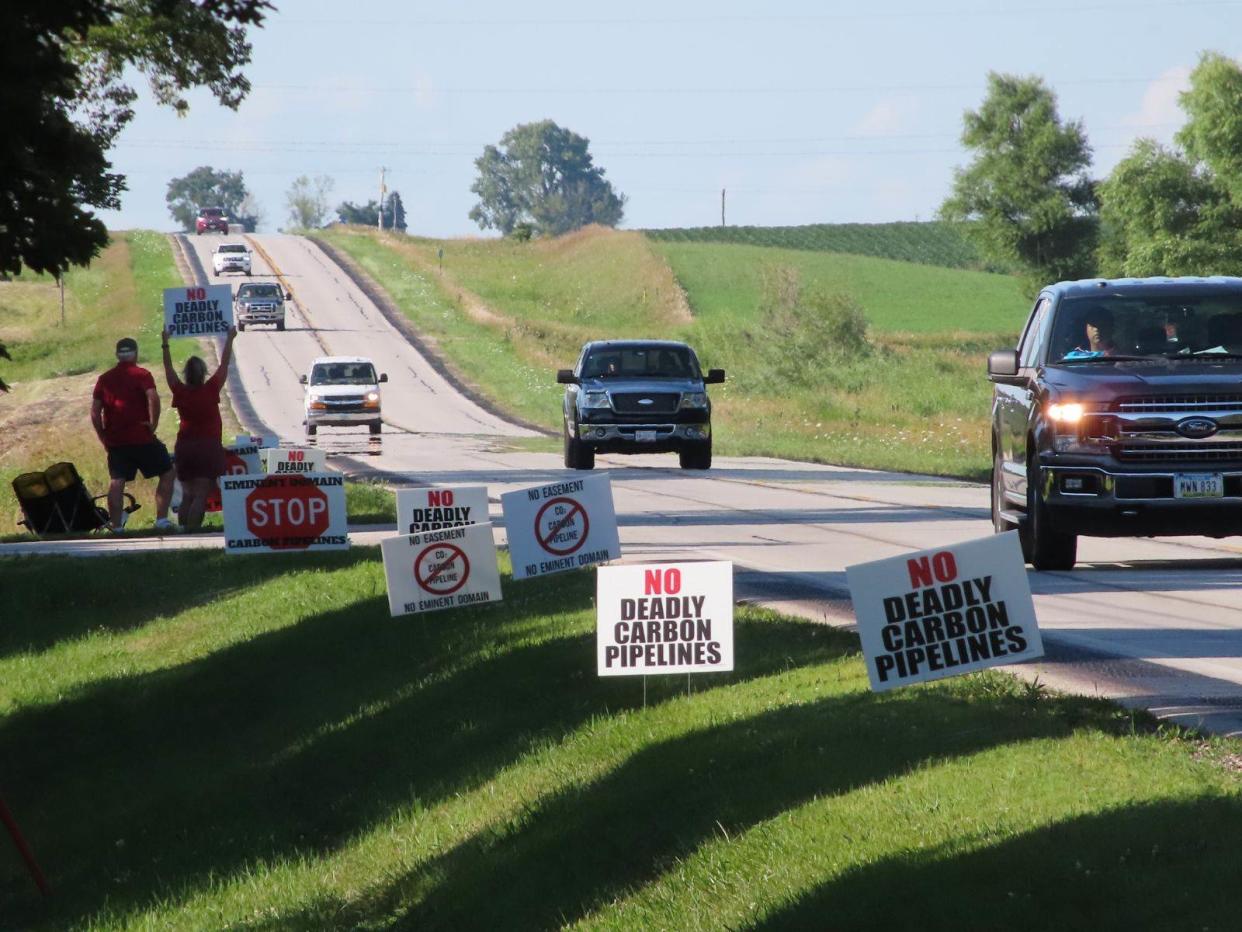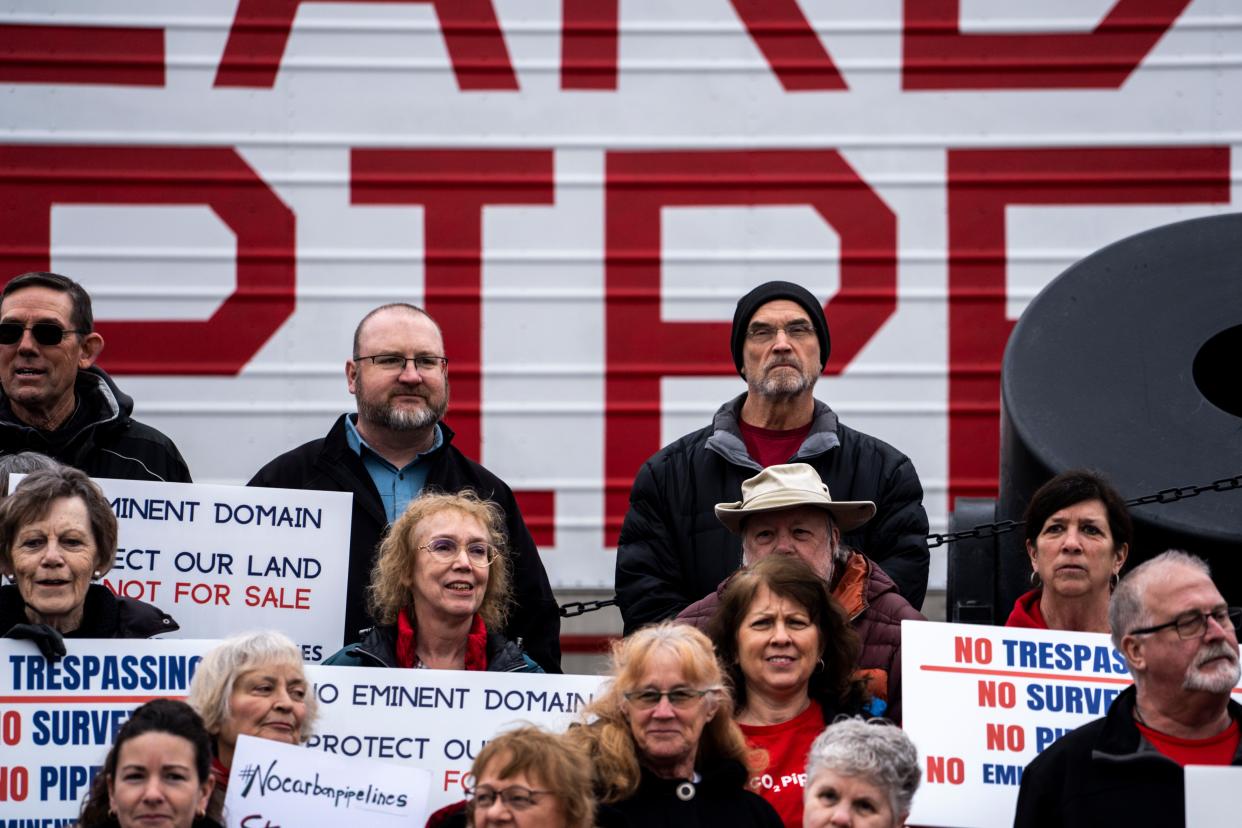Summit Carbon Solutions reapplies for critical North Dakota pipeline permit

With North Dakota a linchpin in its plans for a regional carbon-capture pipeline, Summit Carbon Solutions is promising to reroute it in an effort to win approval from regulators there.
Earlier this month, the North Dakota Public Service Commission denied the Ames company's request to build a 320-mile portion of its $5.5 billion pipeline across the state. It plans to sequester the liquefied carbon dioxide emissions from ethanol and other agricultural industrial plants there, injecting it deep underground.
Some political leaders in the state capital, Bismarck have opposed the project, saying the pipeline route would constrain future residential growth and raise safety concerns. Summit is now making another bid for a permit, proposing to reroute the pipeline 10 miles north of Bismarck and away from areas slated for development.
North Dakota is critical to Summit's project as the ending point for the 2,000-mile pipeline, which would cross five states. Among them is nation-leading ethanol producer Iowa, where pipeline opponents have asked state regulators to postpone Summit’s request to build 700 miles of pipeline in the state until North Dakota approves Summit's permit.
More: What legal issues could decide Summit's carbon pipeline permit request? We asked an expert.
The Iowa Utilities Board, which hasn't issued an order addressing the motions, is set to begin a lengthy hearing on Summit's permit request Tuesday in Fort Dodge. Here's what to know about the North Dakota situation.
Why did the North Dakota Public Service Commission deny Summit's request to build its pipeline across the state?
The three-member commission focused on landowner concerns about the proposed pipeline's route, the impact on property values and future development, and what it said was Summit's failure to adequately address environmental and geological concerns.
Did North Dakota residents have other concerns?
As in Iowa, North Dakota regulators said they heard from residents worried about the potential danger of a pipeline break and damage to drainage tile beneath farm fields, and the company's possible use of eminent domain to force unwilling property owners to sell access to their land for the project.
What were the concerns about the pipeline's route and how did Summit respond?
North Dakota regulators said several landowners had voiced "specific and unique" concerns to Summit, asking the company to reroute the project on or around their property, but heard nothing back. The commission said it "felt that Summit has not taken steps to address outstanding legitimate impacts and concerns expressed by landowners or demonstrated why a reroute is not feasible.”

Summit said the new pipeline route around Bismarck addresses “concerns about city growth and future development," as well as the specific issues of three property owners. Altogether, the company said it had made 570 route changes.
What is Summit doing about geological concerns?
The company also said it had tackled concerns about so-called avoidance areas, described in the North Dakota order as places that are geologically unstable or where the pipeline could come within 500 feet of residences, schools or businesses.
Summit said it had identified 10 residences or businesses within 500 feet of the pipeline and had made route changes so only one remained within the setback area. That property owner had provided a waiver, it said.
Summit also said it had two consultants evaluate 16 areas of concern for landslides. Eight had no landslide characteristics, the company said, and the possibility for a landslide in the others was low. The company recommended following best management practices when crossing slopes and drainage areas.
Regulators said Summit crossed six waterfowl production areas it needed to avoid. But Summit said the areas are not state or national wildlife refuges that require protection. Even so, the company agreed to avoid sensitive wetlands.
More: Meet the Iowans battling over carbon capture pipeline plans as permit hearing is set to begin
What cultural issues were regulators concerned about?
Summit said it would work with the North Dakota State Historical Preservation Office, which found the company’s cultural resource report didn’t meet its standards.
Summit has requested a "limited rehearing" to answer commissioners' questions.
Donnelle Eller covers agriculture, the environment and energy for the Register. Reach her at deller@registermedia.com or 515-284-8457.
This article originally appeared on Des Moines Register: Summit reapplies for North Dakota permit to build carbon pipeline


